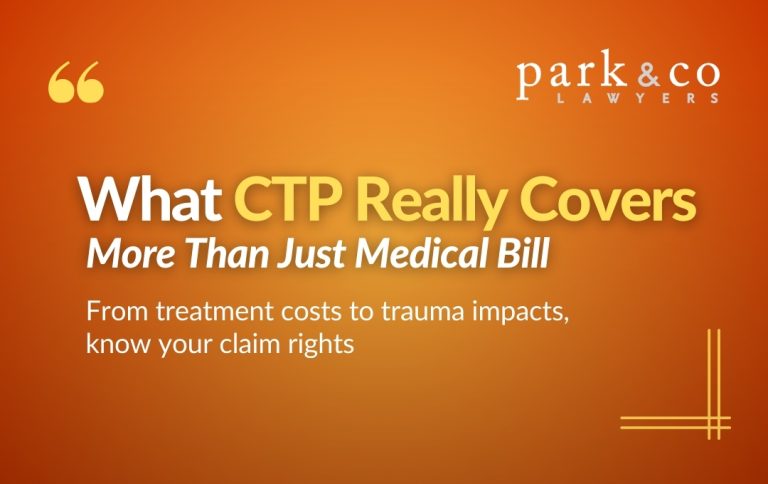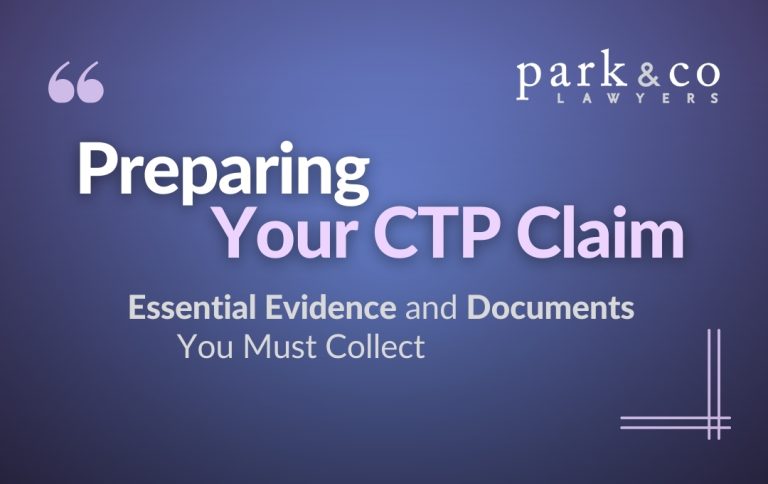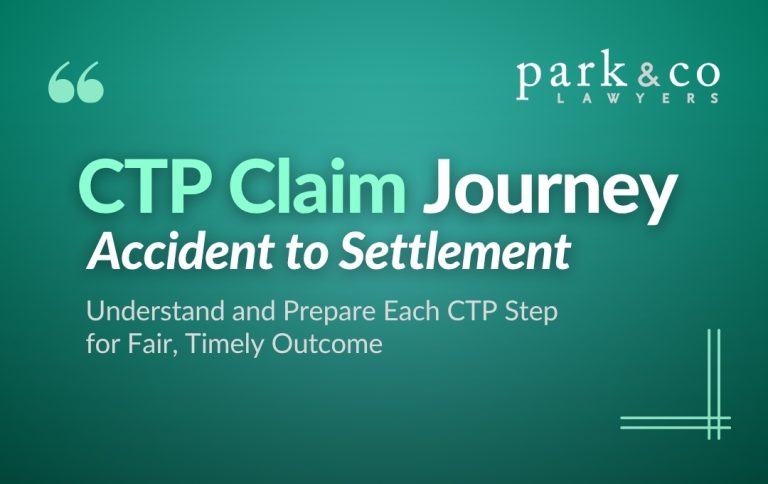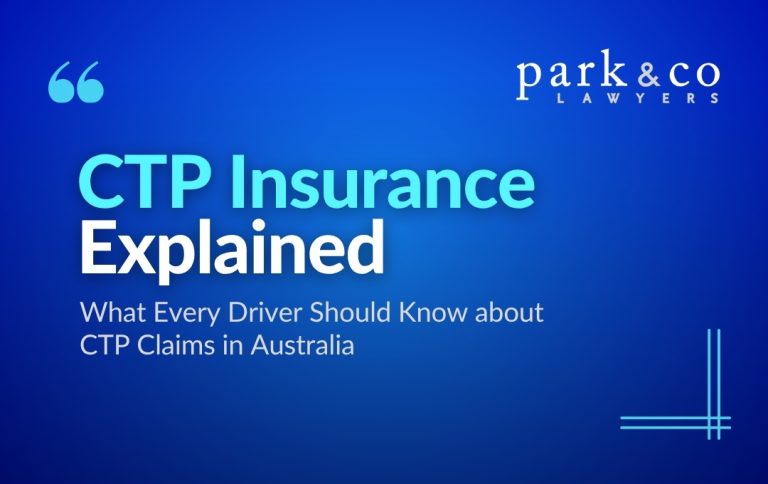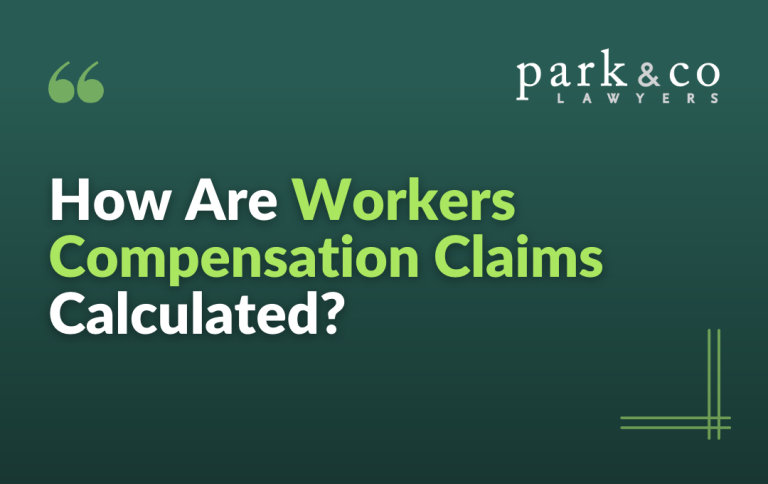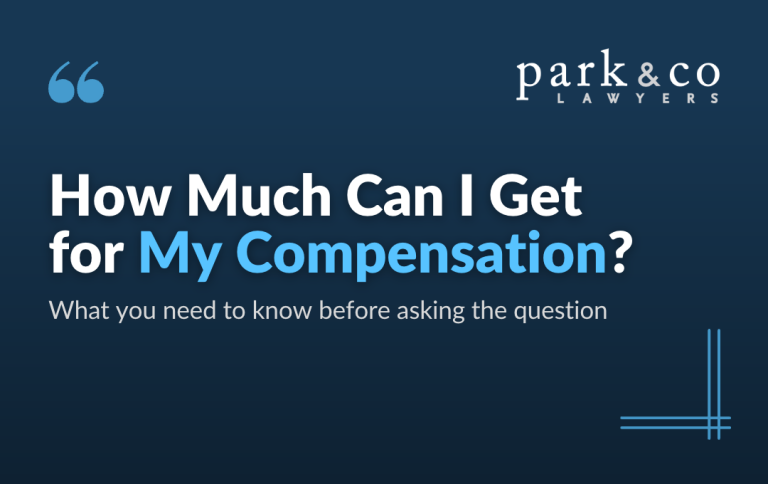Have you been injured
on the road, at work, or in a public place?
We'll guide you through your rights and options.
How We Can Help You
Types of personal injury claims that our dedicated lawyers help with
Road Injuries
You may have been injured in a road accident where you are not at-fault. Whether you were a driver, passenger or pedestrian, you may be entitled to receive compensation for your injuries.
Workplace Injuries
You may have been injured whilst at work, or have sustained psychiatric injuries as a result of bullying or harassment. Whether physical or mental, if your injuries are substantially caused by a workplace accident or incident, you may be entitled to compensation.
Public Place Injuries
You may have been injured as a result of poor safety measures being taken in public places such as a shopping centre, school or restaurant. In such cases, you may be entitled to compensation for your injuries.
Superannuation Insurance Claims
If you can't work due to injury or illness, you might be able to make a superannuation insurance claim. We can check which benefits you're eligible for and help to make sure you get everything you're entitled to.
Medical Negligence
Your doctor or medical professional may have acted negligently or carelessly, leading to an injury you sustained. Furthermore, you may have been given treatment which you did not consent to, leading to injuries. In such cases, you may be entitled to compensation for your injuries.
Sexual Harassment
Have you experienced any unwanted or unwelcome sexual behaviour which made you feel offended, humiliated or intimidated? If you have suffered an injury, whether it be physical or emotional, as a result of a physical or verbal form of sexual harassment, you need to ensure that you obtain the right legal advice to protect your rights.
PROCESS
Getting in Touch
Our lawyers take the time to listen to your concerns, and we will advise you about your options.
Manage Your Claim
Once you engage with us, we will take care of your claim. We develop a winning strategy that maximises your benefits and give you real-time updates.
Receive Compensation Payment
Once your claim is finalised, we will process your payment as soon as we receive it.
what makes us different
Why Park & Co Lawyers?
No Win No Fee
Should you not receive any compensation, any legal fees for our work won't be charged.
Personalised Attention
We take the time to listen to our clients and understand their unique needs and goals. We make sure to keep our clients informed and updated all the way throughout the legal process.
Experience
Our team of solicitors have handled a wide range of cases and we are here to be your reliable companion during the most challenging times.
Result-Oriented
Our focus is always on achieving the best possible outcome for our clients. We are not satisfied until we have done everything we can to help our clients achieve their goals.
After Hour Appointments
If you are unable to meet us during our business hours, we can make it after hours.
Quality of Service
We are committed to delivering exceptional quality services. Our diligent and responsible team of legal professionals consistently goes the extra mile to ensure your needs are met with utmost care and expertise.
What CTP Really Covers: More Than Just Medical Bills
CTP insurance provides compensation based on the overall impact an accident has on the injured person’s life—not just the visible medical bills. It’s important to remember that you may be...
Read MorePreparing Your CTP Claim: Essential Evidence, Documents
When it comes to a CTP (Compulsory Third Party) claim, preparation is everything. If you systematically gather evidence from the moment the accident happens and make sure all required documents...
Read MoreCTP Claim Journey: Accident to Settlement
The CTP (Compulsory Third Party) claim process can feel long and complex—especially if you’re dealing with it for the first time. But when you understand each step and prepare properly,...
Read MoreCTP Explained: What Every Driver Should Know
The core purpose of CTP insurance is to protect road accident victims. Even if the at-fault driver lacks the financial means to pay compensation, the injured party can still receive...
Read MoreHow Are Workers Compensation Claims Calculated?
The damages are for the pain, suffering and loss of amenities that a person has experienced and will continue to experience due to their injuries. For injuries suffered in Queensland,...
Read MoreHow Much Can I Get for My Compensation?
It is a lawyer’s job to help their clients understand how compensation claim works, what rights they have according to law, gather evidence, show proofs, communicate with the other side...
Read MoreCar Accident
Can I make a CTP claim if I am not a permanent resident?
Yes, absolutely. You do not need to be a permanent resident to make a CTP claim. Therefore, don’t worry about your visa status and apply for the claim immediately. Also, making these claims will not affect your chances of obtaining other visas or permanent residency in the future, so you can move forward with the process without any concerns.
When making a CTP claim, do insurance companies monitor my personal life?
While it is not a common practice for insurance companies to conduct regular surveillance or investigations into your daily life, it is possible. The purpose of such investigations is to verify if the information you provided about how your injury impacts your daily life aligns with the observations made by the insurance company.
For instance, the insurance company might scrutinise your Facebook or Instagram posts, and they may even hire a surveillance company to document your daily activities.
While these investigations can sometimes complicate the claims process, it is important to keep in mind that your condition can vary from day to day, and visible evidence is not the sole determinant of your true situation. Hence, there is no need to worry excessively solely because these investigations exist.
Furthermore, insurance companies can investigate your public activities and behaviours, but they cannot intrude into your private space.
Lastly, the most crucial aspect is to provide detailed and honest information about your physical/psychological condition and difficulties to both the insurance companies and your medical providers.
I want to make a CTP claim, but I'm curious about the cost of hiring a lawyer, how it is calculated, and when it needs to be paid.
When proceeding with a CTP claim, in most cases, the lawyer will charge professional fees based on the hours they work. Additionally, there may be additional costs associated with the progress of the claim and gathering evidence, which is called disbursement. For example, there may be incidental expenses such as fees for obtaining the client’s medical records that the lawyer pays to the hospital can be part of disbursement.
You don’t have to pay anything towards the lawyer fees from the beginning to the end of the claim. However, once the claim is finalised, and you are entitled to receive compensation, you will make a single payment for the lawyer’s fees at the end.
Furthermore, at Park & Co Lawyers, we won’t charge any fees under a No Win No Fee agreement if the claim is unsuccessful and you don’t receive compensation. Therefore, you don’t need to bear the burden of lawyer fees.
What does "No Win No Fee" exactly mean? Does it mean that I really don't have to pay the lawyer fees if I don't win the case?
“No Win No Fee” is an agreement with a remarkable condition that if you do not receive compensation from the insurance company due to an unsuccessful claim, the lawyer will not charge you for their fees.
However, it’s important to understand that lawyer fees are typically a combination of two main components. The first is the professional fees charged by the lawyer based on their work, and the second is the disbursement incurred for the progress of the case. For example, this can include expenses paid by the law firm to obtain the client’s medical records from a hospital.
In most “No Win No Fee” agreements, if the claim is unsuccessful and you don’t receive compensation, the lawyer cannot charge you for the lawyer’s professional fees. However, there are often cases where the lawyer can still claim the disbursement incurred for evidence gathering from the client.
Therefore, it’s recommended to carefully review and confirm the specific details with the lawyer/law firm that will handle your case.
When a car accident occurs while riding in a car driven by a friend, can I demand them to cover the medical expenses?
It is not impossible to seek an agreement among the parties involved, including the driver, regarding the payment of medical expenses if the accident was caused by the friend who was driving.
However, even if such an agreement exists, it does not prevent you from exercising your right to file a CTP claim. Moreover, if the driver changes their mind and refuses to cover the medical expenses, it may be difficult to take legal action against them based on the agreement to enforce the promise.
Therefore, in cases where you have been injured due to a traffic accident that was not my fault, it is advisable to seek treatment and compensation through a CTP claim rather than relying on personal arrangements between individuals.
I was riding in my friend's car when they caused an accident, and I got injured. I want to file a CTP claim on my friend's car, but I'm worried about causing financial harm to my friend.
Even if you file a CTP claim through your friend’s vehicle insurance, you don’t need to worry about their CTP insurance premium increasing. With regard to comprehensive insurance that covers vehicle damage, the premium can increase when you make claims. However, this is not the case with CTP insurance.
CTP insurance premiums are regulated by the government in each state, taking into account factors such as vehicle types, overall accident and compensation statistics, insurance company profits, and various economic conditions.
Therefore, while your claim may have an impact on the overall CTP system, it won’t directly affect an increase in your friend’s CTP insurance premium. You can proceed with the claim without worrying about your friend.
I caused an accident where the other driver was injured and I don’t think I have any insurance to cover any potential personal injury claim against me. What should I do?
In Australia, there is a type of insurance called CTP (Compulsory Third Party) insurance that provides coverage for medical expenses and compensation when someone is injured in a car accident.
CTP insurance is automatically included when you renew your vehicle registration annually or every six months, as it is mandatory to pay the premium along with the registration renewal. Therefore, there is no need for you to obtain separate insurance to protect yourself from a personal injury claim against you.
If your vehicle is registered, it automatically includes CTP insurance, which means the injured party can receive treatment and compensation through your CTP insurance. You won’t have to personally pay for their medical expenses.
If I am not a permanent resident, are hospital expenses expensive in Australia?
For the majority of individuals who are not permanent residents, Medicare benefits are not available in Australia although a few specific temporary visas may provide Medicare benefits.
It is important to be aware that visiting a hospital in Australia without Medicare coverage can lead to significantly high costs. For instance, daily hospitalisation expenses can easily amount to thousands of dollars.
If you are unwell and require urgent medical attention, it is crucial to seek medical care regardless of the potential cost. However, it is advisable to carefully review and understand any potential charges that may be incurred when completing hospital admission paperwork.
Moreover, in the case of injuries resulting from a car accident or workplace incident, it is often possible to have hospital expenses covered by CTP insurance or workers’ compensation insurance. Therefore, it is recommended to inquire about your rights and available options in such situations.
Do I need comprehensive car insurance? I am a careful driver and I’ve never caused any car accident.
Yes, it is highly advisable for you to have comprehensive insurance, even if you consider yourself a cautious driver who has never been responsible for a car accident. Having comprehensive insurance provides coverage for property damages to your car and other vehicles involved in an accident.
While your driving record may be impeccable, unforeseen circumstances can arise on the road that are beyond your control. For instance, you may encounter reckless drivers, encounter adverse weather conditions, or become a victim of theft or hit and run. In those circumstances, having insurance ensures you receive compensation, whereas without coverage, you would bear the entire financial burden if your car is damaged. Moreover, if you are at fault in an accident, you would be responsible for covering the repair costs of the other vehicle out of your own pocket.
Considering these potential risks, it is strongly recommended that you obtain car insurance.
An ambulance is approaching near me. What should I do?
While the laws may vary slightly between jurisdictions, the basic rule is that when an emergency vehicle such as a police car or ambulance is approaching displaying a flashing blue or red light or sounding an alarm, you must yield and make way for the vehicle to pass.
If an emergency vehicle is approaching from behind, check your surroundings and, if it is safe to do so, move to the side lane to allow the vehicle to pass. However, if it is not safe to change lanes, do not force your way through. Instead, stop your vehicle and wait for the emergency vehicle to go around you.
At intersections, if an emergency vehicle is approaching from the opposite or adjacent direction, even if you have a green light to proceed, you should reduce your speed or stop until the emergency vehicle has safely passed.
Failure to yield to emergency vehicles can result in fines, and more importantly, it can pose a danger to everyone’s safety. Always remember to give way to emergency vehicles and prioritize safety while driving.
WorkCover
What steps should I take if I get injured at work?
If you sustain injuries at work, there are several important steps you should take.
Firstly, it is crucial to promptly report the incident to your employer or manager. It is recommended to document your report in writing, which can be done through a text message or an email. If your workplace provides an accident report form, be sure to utilise it to record the details of the incident. In cases where you were working alone at the time of the injury, there might be a potential dispute regarding whether it qualifies as a workplace accident. To avoid any complications, it is essential to report the incident in writing as soon as possible.
Secondly, it is imperative to seek immediate medical attention if you are injured in an accident. Schedule an appointment with a general practitioner (GP) or visit the emergency department, depending on the severity of your injuries. Swift medical treatment is crucial to address any immediate health concerns and to establish a medical record documenting the nature and extent of your injuries.
Furthermore, it is highly recommended to consider making a WorkCover claim, as it can help cover your medical expenses and compensate for any wage loss resulting from your injuries.
I was injured at work but my employer told me that he would pay for my medical expenses and therefore, I should not make a WorkCover claim. What should I do?
The simple answer is, No, do not take the money and instead, pursue a WorkCover claim. Some employers may propose paying a sum of approximately $500 to $1,000 for medical expenses, attempting to dissuade workers from filing a WorkCover claim.
However, by lodging a WorkCover claim, you can potentially receive compensation ranging from a few thousand dollars to tens of thousands of dollars to cover your medical expenses. Furthermore, if your work-related injuries prevent you from working, you may also be eligible for compensation for lost wages. Therefore, it is crucial to refrain from accepting the employer’s monetary offer and proceed with filing a WorkCover claim.
What should I do if my employer fires me when I make a WorkCover claim?
The simple answer is that you are legally protected, so you don’t need to worry. The Fair Work Act 2009, which governs employment relationships, includes provisions that prohibit employers from terminating your employment for at least 3 months solely due to your injury. Additionally, each state has specific laws that regulate WorkCover claims and provide further protection by preventing employers from terminating your employment for a certain period of time if the reason for termination is related to your injuries. For instance, in NSW, this period is 6 months, while in QLD, it extends to 12 months. If your employer disregards these laws and wrongfully terminates you, there are legal remedies available to address the situation. Therefore, you can proceed with your WorkCover claim without worry, knowing that you have legal safeguards in place.
Can I make a WorkCover claim if I am not a permanent resident?
Yes, absolutely. You do not need to be a permanent resident to make a WorkCover claim. Therefore, don’t worry about your visa status and apply for the claim immediately. Also, making these claims will not affect your chances of obtaining other visas or permanent residency in the future, so you can move forward with the process without any concerns.
I didn't make a WorkCover claim to receive medical expenses from my employer. However, as my treatment is taking longer than expected, and my employer has stopped paying for the medical costs. Can I make a WorkCover claim now?
Yes, you can. Receiving medical expenses from your employer does not prevent you from making a WorkCover claim. If your employer prevents you from making a WorkCover claim, it is illegal.
However, if you want to make a WorkCover claim, you should start as soon as possible. Each state has different laws and statutes of limitations. For example, in Queensland, if you don’t start a WorkCover claim within 6 months after the accident, your claim may be denied. Therefore, it is advisable to start the process as soon as possible.
I want to make a WorkCover claim, but I'm curious about the cost of hiring a lawyer, how it is calculated, and when it needs to be paid.
When proceeding with a WorkCover claim, in most cases, the lawyer will charge professional fees based on the hours they work. Additionally, there may be additional costs associated with the progress of the claim and gathering evidence, which is called disbursement. For example, there may be incidental expenses such as fees for obtaining the client’s medical records that the lawyer pays to the hospital can be part of disbursement.
You don’t have to pay anything towards the lawyer fees from the beginning to the end of the claim. However, once the claim is finalised, and you are entitled to receive compensation, you will make a single payment for the lawyer’s fees at the end.
Furthermore, at Park & Co Lawyers, we won’t charge any fees under a No Win No Fee agreement if the claim is unsuccessful and you don’t receive compensation. Therefore, you don’t need to bear the burden of lawyer fees.
What does "No Win No Fee" exactly mean? Does it mean that I really don't have to pay the lawyer fees if I don't win the case?
“No Win No Fee” is an agreement with a remarkable condition that if you do not receive compensation from the insurance company due to an unsuccessful claim, the lawyer will not charge you for their fees.
However, it’s important to understand that lawyer fees are typically a combination of two main components. The first is the professional fees charged by the lawyer based on their work, and the second is the disbursement incurred for the progress of the case. For example, this can include expenses paid by the law firm to obtain the client’s medical records from a hospital.
In most “No Win No Fee” agreements, if the claim is unsuccessful and you don’t receive compensation, the lawyer cannot charge you for the lawyer’s professional fees. However, there are often cases where the lawyer can still claim the disbursement incurred for evidence gathering from the client.
Therefore, it’s recommended to carefully review and confirm the specific details with the lawyer/law firm that will handle your case.
If I get injured while working, I'm worried that making a workers' compensation claim will harm my employer. What should I do?
You don’t need to worry about causing harm to your employer. In Australia, regardless of the type of insurance, whenever you use your insurance, you typically have to pay an excess fee in addition to the premiums to maintain the insurance coverage.
Similarly, with workers’ compensation insurance, if an employee files a workers’ compensation claim, the employer usually has to pay an excess fee, which is typically a few hundred dollars, to utilise the workers’ compensation insurance. While a few hundred dollars may seem significant, it is relatively very small compared to the loss associated with your injury including the costs for the required medical treatments.
Moreover, your employer has WorkCover insurance in place precisely for incidents like this when employees get injured while working. Therefore, you should feel free to proceed with a workers’ compensation claim without any hesitation or burden.
If I am not a permanent resident, are hospital expenses expensive in Australia?
For the majority of individuals who are not permanent residents, Medicare benefits are not available in Australia although a few specific temporary visas may provide Medicare benefits.
It is important to be aware that visiting a hospital in Australia without Medicare coverage can lead to significantly high costs. For instance, daily hospitalisation expenses can easily amount to thousands of dollars.
If you are unwell and require urgent medical attention, it is crucial to seek medical care regardless of the potential cost. However, it is advisable to carefully review and understand any potential charges that may be incurred when completing hospital admission paperwork.
Moreover, in the case of injuries resulting from a car accident or workplace incident, it is often possible to have hospital expenses covered by CTP insurance or workers’ compensation insurance. Therefore, it is recommended to inquire about your rights and available options in such situations.
When making a WorkCover claim, does WorkCover monitor my personal life?
While it is not a common practice for insurance companies to conduct regular surveillance or investigations into your daily life, it is possible. The purpose of such investigations is to verify if the information you provided about how your injury impacts your daily life aligns with the observations made by the insurance company.
For instance, the insurance company might scrutinise your Facebook or Instagram posts, and they may even hire a surveillance company to document your daily activities.
While these investigations can sometimes complicate the claims process, it is important to keep in mind that your condition can vary from day to day, and visible evidence is not the sole determinant of your true situation. Hence, there is no need to worry excessively solely because these investigations exist.
Furthermore, insurance companies can investigate your public activities and behaviours, but they cannot intrude into your private space.
Lastly, the most crucial aspect is to provide detailed and honest information about your physical/psychological condition and difficulties to both the insurance companies and your medical providers.

